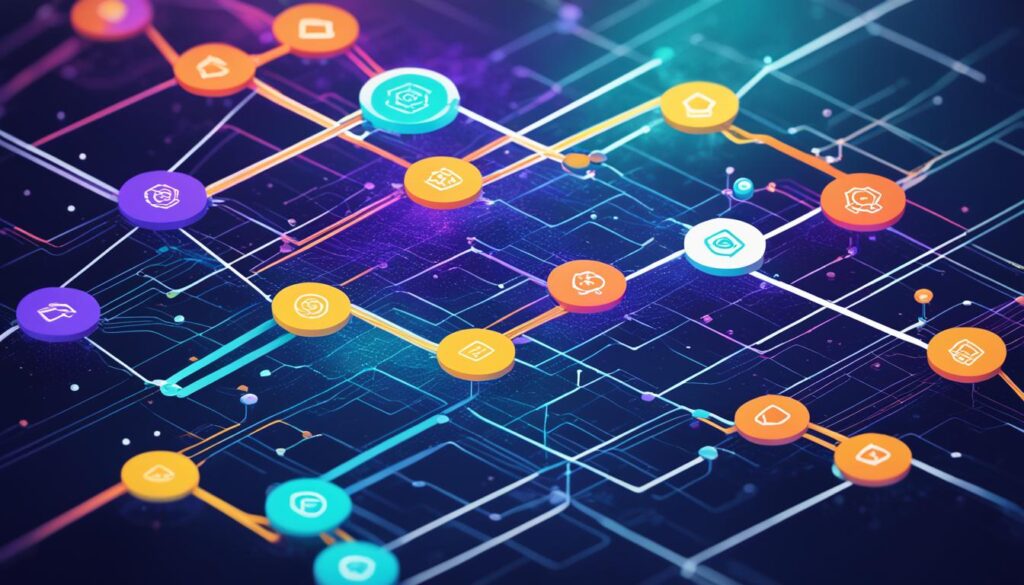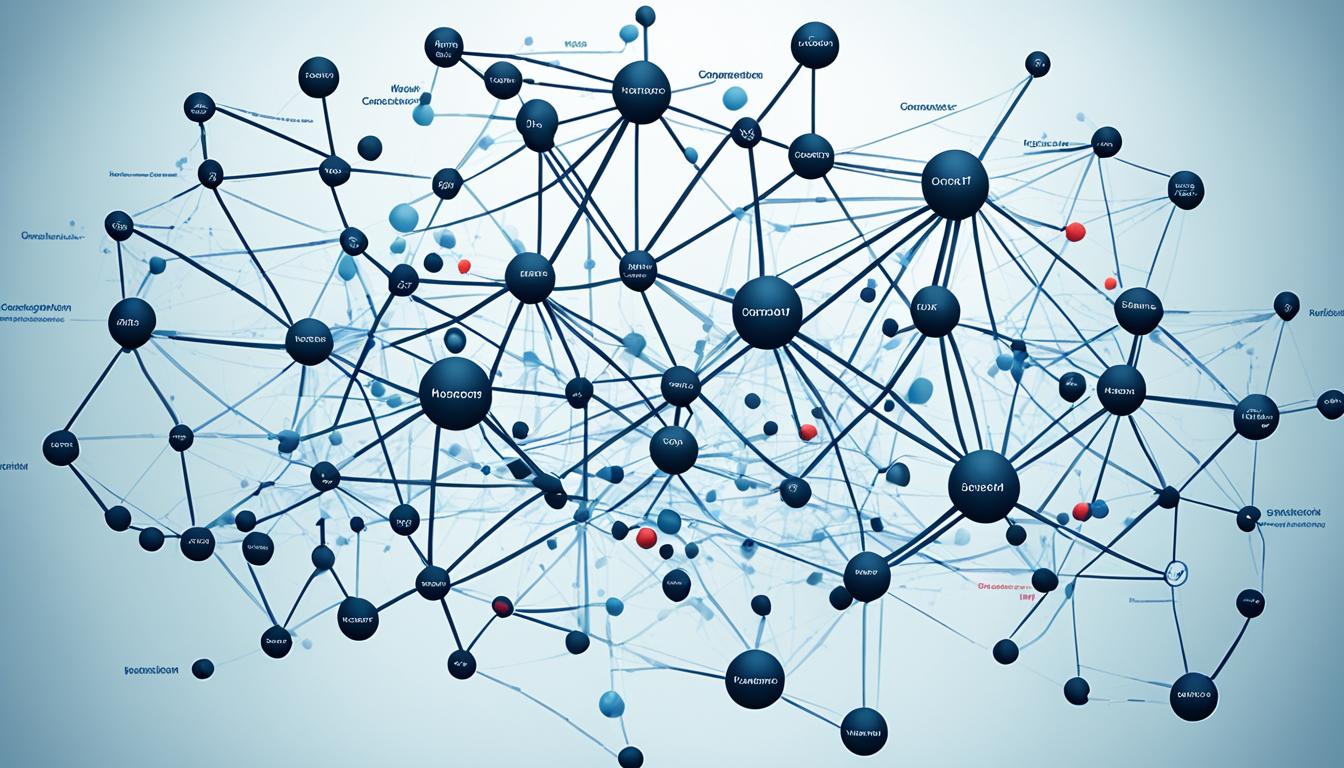Decentralized Autonomous Organizations (DAOs) are disrupting traditional business models and transforming the future of organizations. Powered by blockchain technology and smart contracts, DAOs introduce decentralized decision-making and governance, revolutionizing the way companies operate.
In a decentralized autonomous organization, every participant has an equal voice in important decisions. This democratic governance structure eliminates the need for centralized authorities and hierarchies, allowing for collective decision-making and active stakeholder participation.
Key Takeaways:
- DAOs disrupt traditional business models through decentralized decision-making and governance.
- Blockchain technology and smart contracts power DAOs, enabling transparency and trust.
- DAOs eliminate or reduce intermediaries, resulting in cost reduction and increased efficiency.
- Aligned incentives in DAOs foster collaboration, innovation, and the generation of collective value.
- While still facing technical and regulatory challenges, DAOs have the potential to reshape the business landscape.
Democratic Governance in DAOs
Unlike traditional business models with centralized governance structures, decentralized autonomous organizations (DAOs) operate on a democratic basis. In DAOs, every participant has an equal voice in important decisions, thanks to decentralized protocols and smart contracts.
This unique approach to governance eliminates the need for central authorities and hierarchies, paving the way for decentralized decision-making and stakeholder participation. DAOs empower individuals to actively contribute to the management and direction of the organization.
By utilizing decentralized protocols, DAOs provide a platform for collective decision-making, where all stakeholders have a say in the organization’s operations. This democratic governance model fosters transparency, inclusivity, and diversity of perspectives, enabling more robust and holistic decision-making processes.
“Decentralized governance in DAOs allows for the active participation of stakeholders, fostering a sense of ownership and empowerment.”
– Jane Smith, Decentralization Advocate
Through stakeholder participation, DAOs enable the alignment of interests and values, ensuring decision-making is driven by the collective benefit rather than the whims of a few individuals. This distributed governance model strengthens trust among participants and enhances the overall resilience of the organization.
DAOs are at the forefront of redefining how organizations operate by leveraging the power of decentralized governance and democratizing decision-making processes. This transformative approach empowers individuals and encourages their active involvement in shaping the future of organizations.

| Traditional Organizations | DAOs |
|---|---|
| Centralized decision-making | Decentralized decision-making |
| Concentrated power in the hands of a few | Equal voice for all participants |
| Top-down hierarchy | Flat and inclusive structure |
| Limited stakeholder participation | Active involvement of stakeholders |
As depicted in the table above, decentralized governance in DAOs revolutionizes decision-making processes, empowering stakeholders and enabling a more inclusive and equitable organizational structure.
Transparency and Trust in DAOs
Decentralized Autonomous Organizations (DAOs) are built on the foundation of distributed ledger technologies, particularly blockchain. This technology ensures transparency, immutability, and trust in the operations of DAOs.
The use of blockchain technology in DAOs provides unparalleled transparency. Every transaction and decision made within a DAO is recorded on a public ledger, accessible to all participants. This blockchain transparency enables anyone to verify and validate the authenticity of these transactions, promoting a high level of trust among DAO members.
With distributed ledger technologies, DAOs eliminate the need for intermediaries and third-party verifications. Trustless transactions are made possible by the consensus mechanism employed in blockchain networks. This means that all transactions are verified and processed by network participants without relying on a central authority. Consequently, DAOs foster a trustless environment where transactions can occur with confidence.
“The transparency provided by blockchain technology creates a trustless environment in DAOs, where all transactions and decisions are recorded on a public ledger accessible to all participants. This enhances trust among DAO members and reduces the reliance on third-party verifications.”
The immutability of blockchain technology is another crucial aspect that enhances trust in DAOs. Once recorded on the blockchain, transactions cannot be altered or tampered with. This immutability feature ensures the integrity of the data within a DAO, safeguarding against fraud or malicious activities.
Overall, blockchain transparency, distributed ledger technologies, trustless transactions, and immutability contribute to creating a highly trustworthy environment in DAOs. Participants can confidently engage in transactions and decision-making processes, knowing that their actions are transparent and verifiable. This transparency and trust are essential for the success and widespread adoption of DAOs in revolutionizing traditional business models.
| Benefits of Transparency and Trust in DAOs |
|---|
| Enhanced trust: Blockchain transparency fosters trust among DAO members, ensuring the integrity of transactions and decisions. |
| Reduced reliance on intermediaries: Trustless transactions eliminate the need for intermediaries, reducing costs and increasing efficiency. |
| Protection against fraud: Immutability safeguards the integrity of data, preventing fraud or tampering. |
| Greater accountability: Transparency holds participants accountable for their actions within the DAO ecosystem. |

Elimination of Intermediaries in DAOs
One of the key disruptions caused by DAOs is the elimination or significant reduction of intermediaries. In traditional business models, intermediaries such as banks and financial institutions play a crucial role in transactions. With DAOs, transactions are executed directly between involved parties, powered by smart contracts. This not only reduces costs but also increases efficiency and the speed of business operations.
In traditional transactions, intermediaries often introduce additional costs due to their involvement. These costs can include fees, commissions, and processing charges, which can substantially impact the overall cost of doing business. By eliminating the need for intermediaries, DAOs provide a cost reduction advantage, allowing businesses to allocate their financial resources more effectively.
Moreover, the elimination of intermediaries in DAOs enhances efficiency by streamlining transaction processes. With direct transactions facilitated by smart contracts, the need for multiple layers of verification and approval is eliminated. This reduces the time required to complete transactions, enabling businesses to operate more swiftly and seize opportunities in a dynamic market environment.
Furthermore, the direct nature of transactions in DAOs enhances security and trust. When transactions occur between parties without intermediaries, the risks associated with malicious activities or errors introduced by intermediaries are significantly reduced. Smart contracts, which automatically execute predefined conditions, add an additional layer of security and trustworthiness to the transaction process.
In summary, the elimination of intermediaries in DAOs brings several benefits, including cost reduction, increased efficiency, and enhanced security. Direct transactions powered by smart contracts enable businesses to optimize their financial resources, operate more swiftly, and foster trust among participants. The next section will explore another key aspect of DAOs: Aligned Incentives.
Aligned Incentives in DAOs
DAOs (Decentralized Autonomous Organizations) have revolutionized traditional business models by introducing innovative incentive systems based on cryptographic tokens. These tokens serve as a form of reward for participants who contribute valuable expertise, resources, or effort to the DAO ecosystem.
By aligning economic incentives, DAOs incentivize collaboration and innovation among their members, creating a thriving community that generates collective value. Participants are motivated to actively engage and contribute to the DAO’s goals, as their efforts are directly rewarded with token rewards.
These tokens can represent financial value, allowing participants to enjoy the benefits of their contributions. Additionally, tokens can also confer governance rights within the organization, ensuring that decision-making powers are distributed to those who have demonstrated their commitment and expertise.
Through this incentive structure, DAOs foster an environment where collaboration thrives. Participants have a vested interest in the success of the organization, driving them to work together towards common goals and objectives. The transparent nature of DAOs, facilitated by blockchain technology, enhances trust and encourages open sharing of ideas and resources for collective advancement.
“By aligning economic incentives, DAOs harness the power of collective intelligence and innovation, enabling individuals from diverse backgrounds to collaborate effectively and co-create value.”
In this decentralized landscape, the aligned interests of participants incentivize continuous improvement and innovation. Token rewards drive individuals to explore new ideas and experiment with novel solutions, pushing the boundaries of what’s possible.
By removing traditional barriers and creating economic incentives, DAOs empower individuals to unlock their full potential and contribute meaningfully to the organization. The collaborative nature of DAOs offers an inclusive and rewarding experience, benefiting both individuals and the collective.

Benefits of Aligned Incentives in DAOs
| Benefits | Description |
|---|---|
| Enhanced Collaboration | Aligned incentives foster a collaborative environment, driving participants to synergize their efforts towards common goals. |
| Innovation and Creativity | Token rewards motivate individuals to explore innovative ideas and experiment with novel solutions, leading to continuous improvement. |
| Merit-based Governance | Aligned incentives ensure that decision-making powers are distributed based on demonstrated expertise and commitment, promoting an inclusive and fair governance structure. |
| Increased Participation | Token rewards incentivize active participation from members, encouraging greater involvement and contribution to the DAO ecosystem. |
| Collective Value Generation | Aligned incentives drive individuals to work together, resulting in the creation of shared value that benefits the entire DAO community. |
Conclusion
As DAOs continue to develop and gain popularity, they are revolutionizing traditional business models and reshaping the future of organizations. The decentralized nature of DAOs brings about democratic governance, transparency, and the elimination of intermediaries, creating a more efficient and inclusive business environment.
However, despite their potential, DAOs still face technical and regulatory challenges. As with any emerging technology, there are hurdles to overcome in terms of scalability, security, and legal frameworks. It is essential to address these challenges to ensure the widespread adoption and success of DAOs.
Nevertheless, the DAO revolution is underway, and it has the power to reshape the business landscape on a global scale. With their decentralized decision-making and aligned incentives, DAOs foster collaboration and drive innovation. As we move towards a more decentralized future, DAOs have the potential to bring about a paradigm shift in the way we do business, offering new opportunities and unlocking untapped potential.
FAQ
How do decentralized autonomous organizations (DAOs) disrupt traditional business models?
DAOs disrupt traditional business models by introducing decentralized decision-making and governance, eliminating the need for centralized authorities and hierarchies.
What is the role of democratic governance in DAOs?
In DAOs, every participant has an equal voice in decision-making, thanks to smart contracts and decentralized protocols, enabling collective decision-making and stakeholder participation.
How do DAOs ensure transparency and trust?
DAOs are built on blockchain technology, which provides transparency and immutability. All transactions and decisions are recorded on a public ledger, fostering trust among DAO members and reducing reliance on third parties.
How do DAOs eliminate intermediaries?
DAOs enable direct transactions between involved parties, powered by smart contracts. This eliminates the need for intermediaries such as banks and financial institutions, reducing costs and increasing efficiency.
How do aligned incentives work in DAOs?
DAOs implement incentive systems using cryptographic tokens. Participants are rewarded with tokens for their contributions, aligning their interests and fostering collaboration, innovation, and the generation of collective value.








